What do Republicans Want? Survey Analysis on the Political and Policy Preferences of GOP Voters in Iowa, New Hampshire, and South Carolina

Throughout July, the Manhattan Institute polled representative samples of likely 2024 Republican presidential primary and caucus voters in three key states: Iowa (639 respondents), New Hampshire (704 respondents), and South Carolina (707 respondents). Using a mixed sample that included landline, cell-phone, SMS, online, and in-app responses, the survey dug into influential early-state Republicans’ feelings about the presidential field and the policies that will shape the nominating contest.
The results paint a picture of a primary electorate that is more conservative on newer cultural debates revolving around race and gender than it is on perennial social issues such as abortion and gun rights, despite the latter pair of issues still looming larger as a part of GOP identity. The data suggest that the GOP base is more hawkish on foreign policy and more market-oriented on economic policy than media accounts focused on factional disputes tend to suggest. Immigration is a high priority—second only to economic concerns—but even with outrage over illegal crossings at the southern border, Republicans reject total restrictionism and wish to ease legal immigration for the highly skilled and financially independent.
Consistent with other polling, our results suggest that the 2024 nomination is Donald Trump’s to lose. The former president’s lead notwithstanding, a sizable chunk of the electorate remains open to changing their mind and the consensus second-place pick, Florida Governor Ron DeSantis, holds a higher net favorability rating among Republicans than Trump. An early lead should not necessarily be mistaken for an insurmountable one.
Full Results: Topline, Crosstabs: Iowa, New Hampshire, South Carolina
Ideological Orientation and Issue Prioritization
Unsurprisingly, the lion’s share of likely Republican primary voters in Iowa, South Carolina, and even comparatively moderate New Hampshire classify themselves as conservative. Voters generally identify as more conservative on questions of economic and fiscal policy than on longstanding social issues, like abortion and gun rights. On newer cultural issues such as gender transitions for minors and critical race theory (CRT) in schools and companies, sizeable majorities of voters in all three states report being “very conservative” (Figure 1).
Figure 1
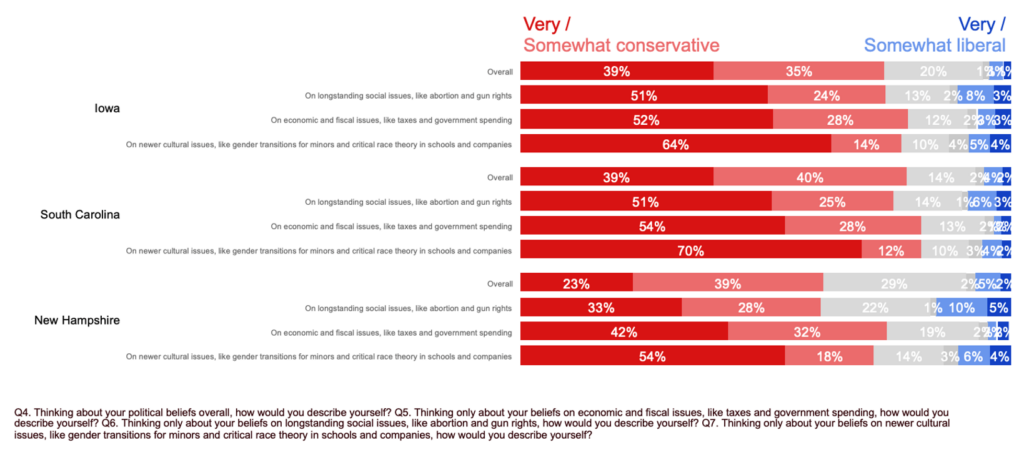
Despite GOP primary voters holding more conservative views on race- and gender-centric social issues, they still list the pro-life and pro-Second Amendment causes—which conservatives have invested in building infrastructure around for decades—as higher priorities. That said, it is significant that cultural issues like CRT and protecting girls’ sports—which have only come into national focus in the last couple of years—now run only a few points behind abortion in terms of importance to Republicans (Figure 2).
Figure 2

It is also notable that more than a third of voters in Iowa and South Carolina—and nearly half in New Hampshire—say they would prefer a candidate who does not focus on any of these social issues (Figure 3). After all, each of these matters lag far behind the three issues voters consistently cite as their top priority in the presidential contest: inflation and the economy (IA: 28%, SC: 34%, NH: 29%), taxes/government spending (IA: 15%, SC: 12%, NH: 17%), and immigration and the border (IA: 14%, SC: 15%, NH: 14%).
Figure 3

The State of the Race
The Manhattan Institute’s findings on the race for the Republican presidential nomination are consistent with many of the other 2024 GOP polls to date. Trump (IA: 42%, SC: 43%, NH: 44%) holds a commanding lead over the GOP field with DeSantis in second place (IA: 17%, SC: 21%, NH: 13%). The third and fourth place positions vary from state to state. Tim Scott (IA: 10%, SC: 11%, NH: 7%) and Nikki Haley (IA: 5%, SC: 8%, NH: 7%) hold the next two slots in their home state of South Carolina, but Chris Christie (IA: 4%, SC: 3%, NH: 11%) and Vivek Ramaswamy (IA: 6%, SC: 4%, NH: 8%) are better positioned in New Hampshire (Figures 4–6).
Figure 4

Figure 5

Figure 6

Many voters say they may change their mind: 44% of voters in Iowa, 38% in South Carolina, and 50% in New Hampshire are not sure whether they will ultimately support their first-choice candidate at this stage in the race. Trump supporters, however, are much firmer in their commitment to their choice than are supporters of any other candidate. Between 75%–78% of Trump supporters in each state say they will definitely back him. DeSantis is the most favored second choice among voters—including Trump supporters (Figures 7–9)—but 59% of DeSantis’s Iowa supporters, 40% of his South Carolina supporters, and 60% of his New Hampshire supporters say they may change their mind about backing him.
Figure 7

Figure 8

Figure 9

In a head-to-head race between Trump and DeSantis, the race tightens but Trump retains an edge—by 11% in Iowa, 12% in South Carolina, and 4% in New Hampshire. DeSantis beats Trump by a wide margin in drawing support from voters backing other candidates in the field (Figures 10–12). On the question of who has the best chance to beat President Joe Biden, Trump’s lead narrows once again with primary voters. He edges DeSantis on electability by 5% in Iowa, 6% in South Carolina, and 2% in New Hampshire.
Figure 10

Figure 11

Figure 12

The only metric on which DeSantis edges Trump head-to-head is on how the two men handled Covid-19, vaccines, and booster shots. On this measure, they are even in Iowa, with DeSantis enjoying a 4% lead over Trump in South Carolina and a 9% lead in New Hampshire.
In all states polled, DeSantis and Scott lead Trump in net favorability scores among GOP voters, but Trump also scores the highest percentage of “very favorable” responses (Figure 13). In other words, despite not being the candidate viewed most positively by Republicans overall, Trump still holds the largest block of unshakable diehards. Of all other candidates, DeSantis and Scott receive the best favorability ratings from Trump supporters (Figure 14)
Figure 13

Figure 14

Voter Profiles
One of the starkest points of contrast between Trump and DeSantis supporters is in how they understand the role of a Republican political candidate for office. DeSantis supporters are much more likely to say that it is most important for Republican candidates to win elections and be in power, even if that means making compromises or moderating their position on certain policies. Trump supporters are more likely to say that it is most important for Republican candidates to stay true to their principles and fight for the policies they believe in, even if that means losing elections and not being in power. On this metric, Trump supporters have more in common with Christie supporters than they do with DeSantis supporters (Figures 15–17).
Figure 15

Figure 16

Figure 17

By analyzing the supporters of each of the leading GOP presidential candidates across all three states, we can gain a better understanding of the demographic profile of each candidate’s coalition. Trump supporters are disproportionately non-college educated, very conservative, focused on election integrity and guns, and surprisingly female (Figure 18). DeSantis supporters are disproportionately young, focused on issues like education, gender ideology, critical race theory, crime, and—perhaps most interesting—over-indexed on both “somewhat conservative” and “very conservative” (Figure 19). Scott supporters are disproportionately older, more moderate, religious, and focused on foreign policy (Figure 20). And Christie supporters are disproportionately moderate or liberal, independent, and do not attend church (Figure 21).
Figure 18

Figure 19

Figure 20
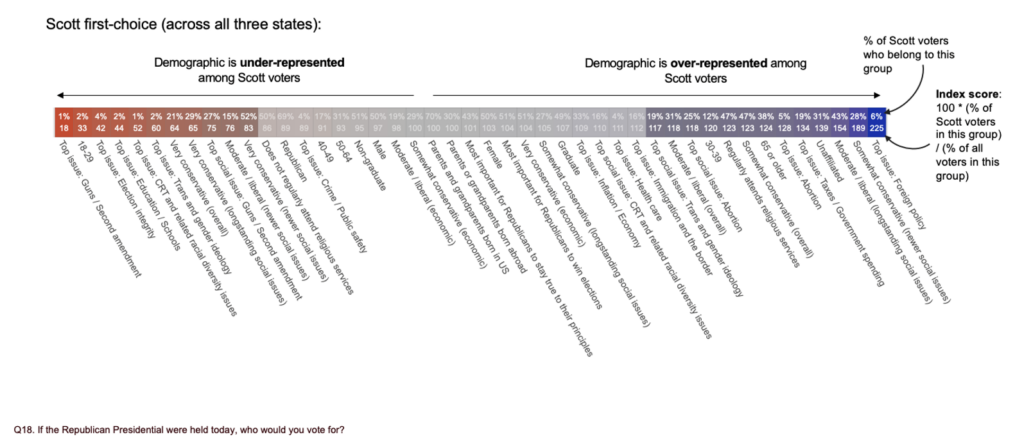
Figure 21

Russia/Ukraine and Military Spending
An overwhelming majority of likely Republican primary participants across all states polled believe the Biden administration has not been tough enough in punishing Russia for the invasion of Ukraine (Figures 22–24). Beyond that, even larger majorities of Republicans in Iowa (72%), South Carolina (73%), and New Hampshire (69%) say that Vladimir Putin is a war criminal.
Figure 22

Figure 23

Figure 24

Sizable majorities of GOP primary voters in all states polled also say that the federal government is spending too little on national security and the military. That said, Republicans are more closely divided on the Biden administration’s continuing support for Ukraine. Roughly equal numbers of primary voters in each state say the current administration is doing too much as say the administration is doing too little or about the right amount (Figure 25).
Figure 25

Economic Policy
On the question of how the federal government can help grow American manufacturing most effectively, vast majorities of GOP voters opt for deregulation and tax cuts over industrial policy ideas like regulations, tariffs, and subsidies (Figures 26–28).
Figure 26
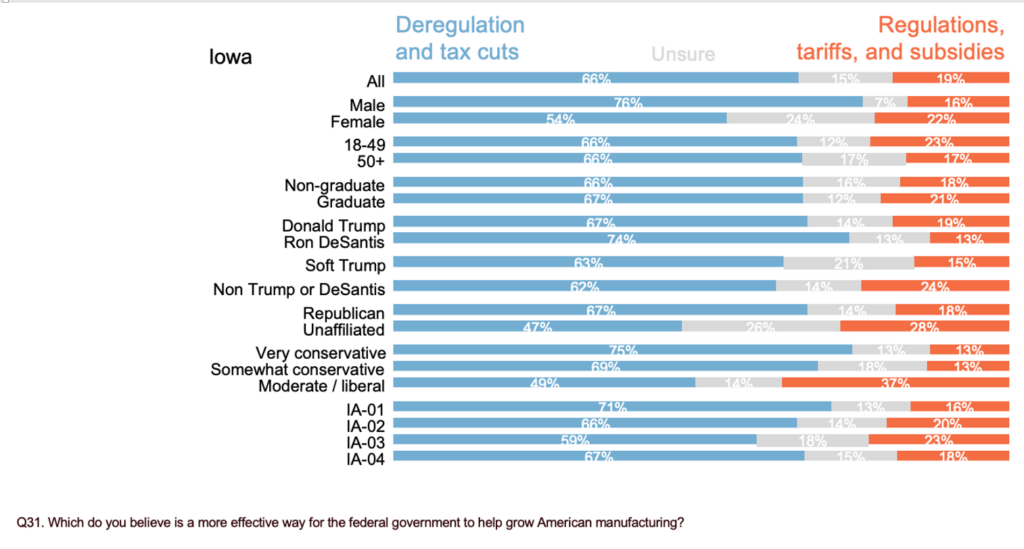
Figure 27
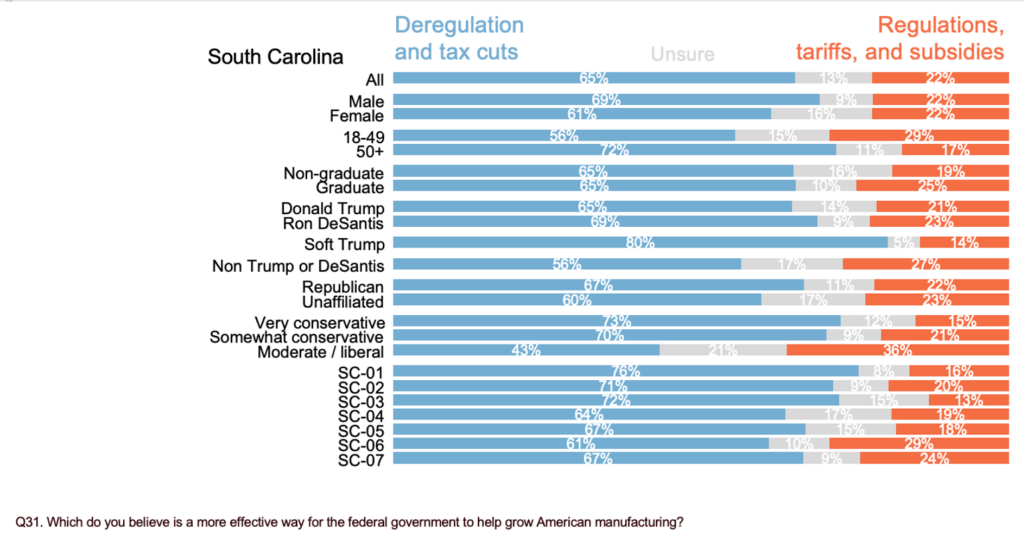
Figure 28

Overwhelming majorities of Republicans also believe that increasing trade with ally countries is good for the U.S., but increasing trade with adversary countries is bad. Significant minorities instead opt for the blanket, simple statement that increasing trade with other countries is good for the United States. Only a tiny subset of GOP voters believe increasing trade with other countries is bad for the country (Figures 29–31).
Figure 29
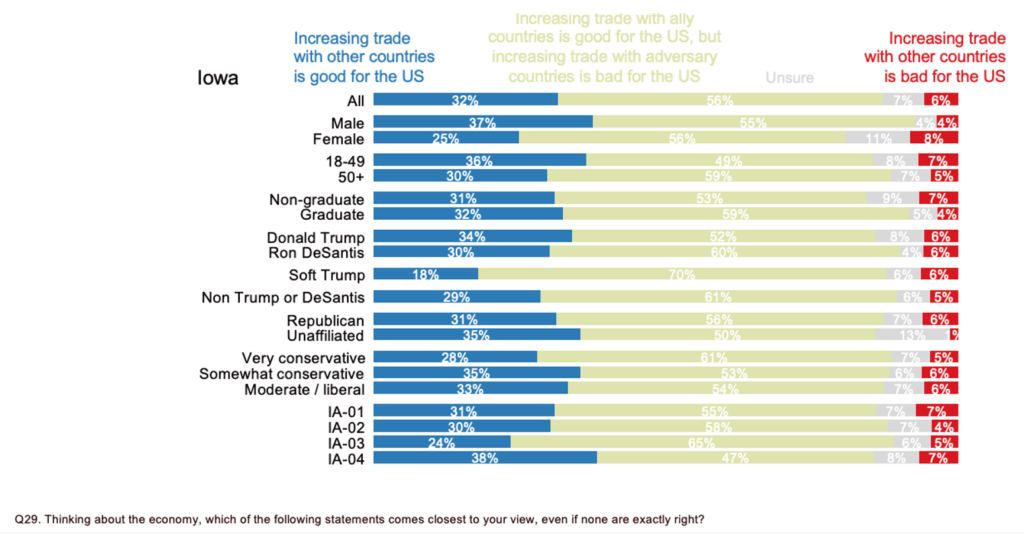
Figure 30

Figure 31

Entitlements and their impact on taxes over time present a much closer call for Republicans, with apparent gaps between older and younger respondents (Figures 32–34).
Figure 32
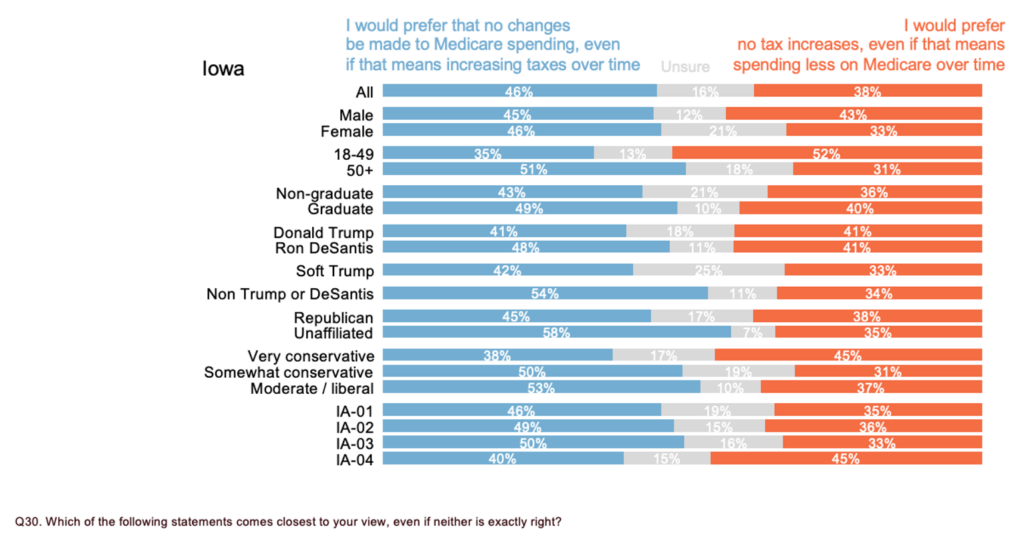
Figure 33

Figure 34

Crime, Guns, and Culture
In order to assess GOP voters’ feelings about and familiarity with the First Step Act—Trump’s signature criminal justice reform—the Manhattan Institute survey split the sample of respondents into two groups that received nearly identical prompts describing the bipartisan law. The only distinction was whether or not it was noted that the legislation “was signed into law by President Donald Trump.” Only around one in ten primary/caucus participants say they are very familiar with the bill, so it is worth taking these figures with a grain of salt (Figure 35).
Figure 35

Based on a basic description alone, initial support for the act is high, though very soft (Figure 36). When presented with brief descriptions of the arguments advanced by proponents and opponents of the reform, Republicans generally agree that the law makes our country less safe—unless they had been reminded that it was Trump who signed the reform into law. In that instance, voters tend to rally around the policy (Figure 37).
Figure 36

Figure 37

And yet, GOP voters resoundingly reject the notion that the U.S. has an overincarceration problem. To the contrary, overwhelming majorities in all three states say that we do not incarcerate enough criminals in the United States (IA: 64%, SC: 67%, NH: 63%). Only a small minority of Republicans feel that the U.S. incarcerates too many criminals (IA: 15%, SC: 12%, NH: 16%) or even the right amount (IA: 11%, SC: 12%, NH: 11%) of criminals.
Respondents across all states also express strong support for more aggressively prosecuting perpetrators of gun crimes. There is also overwhelming support for a slew of other proposals that would toughen gun laws, including universal background checks, mental health checks on gun buyers, and allowing police to temporarily take guns away from people who have been shown to be a danger to themselves or others. Republicans generally rank guns and the Second Amendment as higher priorities than diversity and discrimination issues related to race. However, they do support toughening some gun laws and their enforcement. And on the latter group of issues, they are highly inclined toward policies pushing for colorblindness (i.e., ending affirmative action, mandatory diversity trainings, and funding for DEI at public universities) (Figures 38–40).
Figure 38

Figure 39

Figure 40

Abortion
The Manhattan Institute poll tested the popularity of a six-week heartbeat abortion law (with numerous exceptions), along the lines of what DeSantis implemented in Florida and Governor Kim Reynolds signed into law in Iowa. Most GOP voters in Iowa and South Carolina back such a measure, but the proposal is more divisive among Republicans in New Hampshire (Figure 41). A plurality of New Hampshire Republicans believes that such a law would go too far, whereas pluralities in Iowa and South Carolina say it would be about right. Less than a third of Iowa Republicans believe that such a law would not go far enough, and that group shrinks by orders of magnitude in South Carolina and New Hampshire (Figure 42).
Figure 41
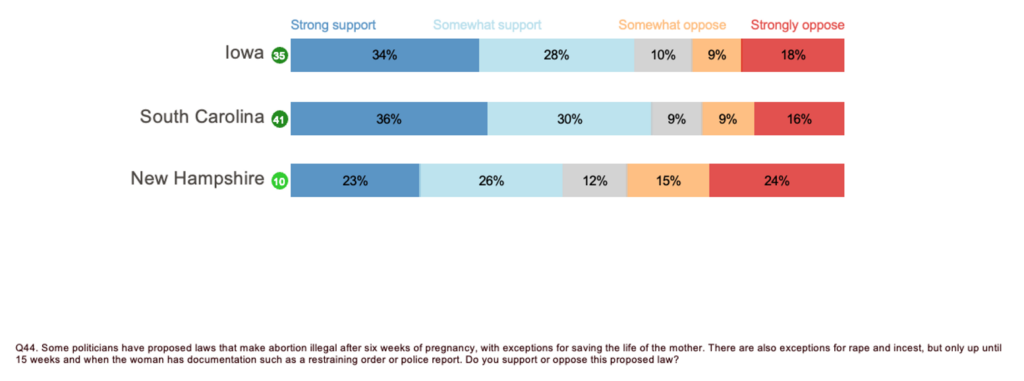
Figure 42

Immigration
Virtually all Republicans view illegal immigration and the situation at the southern border as a critical or important threat (Figure 43), but only one in four likely primary voters want fewer legal immigrants admitted to the country. A large majority wish to see the number of legal immigrants either raised or kept at the present level (Figure 44).
Figure 43

Figure 44

Nearly half of the primary electorate wants to see the legal immigration process made easier, at least for certain groups, like relatives of American citizens or skilled workers with job offers (Figure 45). A plurality of Republicans in each state support making the process easier for immediate family members of U.S. citizens and professionals with advanced degrees in STEM. A significant portion of respondents support making it easier for investors who will create jobs (Figures 46–48). The most important factor to voters in determining whether someone should be allowed to immigrate to the U.S.—by a wide margin—is that they do not need to rely on public welfare benefits (Figure 49).
Figure 45

Figure 46

Figure 47
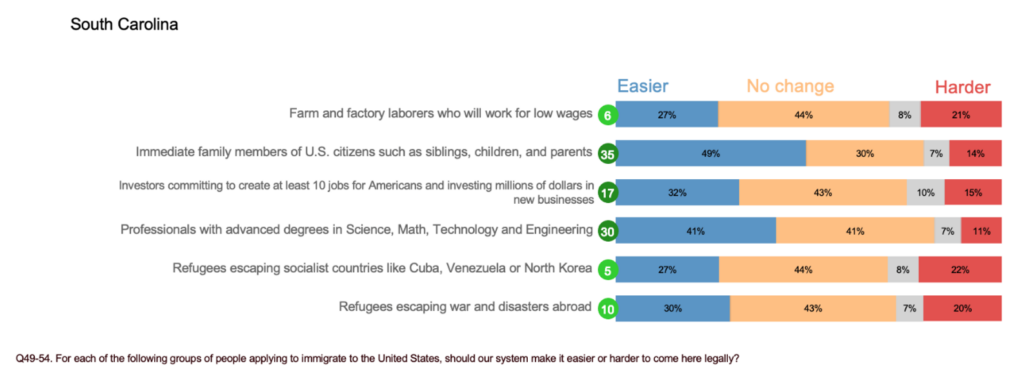
Figure 48

Figure 49

Photo: adamkaz/iStock
Are you interested in supporting the Manhattan Institute’s public-interest research and journalism? As a 501(c)(3) nonprofit, donations in support of MI and its scholars’ work are fully tax-deductible as provided by law (EIN #13-2912529).